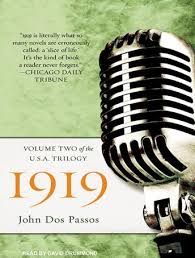1919
by John Dos Passos 1932
‘1919’ is the second book in Dos Passos’s ‘USA’ trilogy. Which immediately begs the question, why read only the middle book in a trilogy? You wouldn’t read only ‘The Two Towers’, would you? I think there are several reasons why I am going to resist the temptation to read the rest of ‘USA’. Firstly, ‘1919’ (and only ‘1919’) was recommended by the Guardian’s list of 100 best novels written in English; second, having now read this novel, to go back to the first volume seems a bit pointless; third , I just don’t have the appetite for another 800 pages of this trilogy. The novels are intended to stand alone and I am going to take the author at his word on this (even though many online reviews argue that reading the whole trilogy is the only way to properly appreciate its constituent parts).
, I just don’t have the appetite for another 800 pages of this trilogy. The novels are intended to stand alone and I am going to take the author at his word on this (even though many online reviews argue that reading the whole trilogy is the only way to properly appreciate its constituent parts).
At one time Dos Passos was ranked with the greats of American post-war literature – Hemingway, Faulkner, Steinbeck and Fitzgerald. While their novels have stood the test of time, I don’t think the same can be said for Dos Passos. ‘1919’ has only two reviews on Amazon’s UK site, compared to over 2,000 for Gatsby, and 1,500 for The Grapes of Wrath (Faulkner, by comparison, is little reviewed – go figure). ‘1919’ uses many innovative techniques, and these are some of the most successful aspects of the novel. Chapters are introduced with short scraps of text from newspaper and magazine headlines, followed by stream of consciousness, camera-reel impressions of the events of the following chapter. Interspersed elsewhere are short pen pictures of a series of American political and military figures who played a part in the First World War, and the industrial struggles in the United States at about the same time. (The Los Angeles Review of Books described these sections of the novels as “disruptive bumps in the reader’s way (which) have no bearing on the story, but add Americana-flavored flamboyance to the proceedings”. (It’s worth reading the whole of this review which is a pretty magisterial take down of the trilogy, describing it as “The Great American Novel That Wasn’t”!)
The body of the novel is a more traditional narrative telling the stories of five principal characters. Although these characters are Americans, the war takes them all to Europe, when the bulk of the novel’s events occur. Despite America’s extensive involvement in the war, none of the characters are involved directly in the conflict, serving as merchant seamen, ambulance drivers, or working with the Red Cross. There is a relentlessness about these stories – things happen, then something else happens, then yet more events; with troubled love affairs acting as the inevitable punctuation to another round of meetings, dinners, drinks, journeys back and forth between Rome and Paris, and so on. Because I didn’t care about these characters – possibly because I had not read about them in the first volume – I found these parts of the novel tiresome.
As an invocation of what it was like to be an American in Europe in 1917-1919 – privileged, largely immune from the conflict, endlessly bumping into one another – I am sure this is a faithful portrait. But apart from the tediousness of the primary narrative, there were other aspects of the novel which jarred. The condescending attitude towards Europeans often found in American popular culture crops up here far too often. Also prevalent is a racist (the n-word is used freely), anti-semitic, misogynist bundle of nasty prejudices which are given full rein and go completely unchallenged, despite Dos Passos’s apparent left wing ideals. As a small concession to this reactionary tide the novel closes with a historically arguable portrait of an attack on American Trade Unionists (the Centralia massacre) which is very sympathetic to the IWW (the international Workers of the World, also known as the Wobblies).
As an attempt to describe how a better world could have emerged from the ashes of the First World War ‘1919’ fails completely – it is desperately pessimistic. All strikes are defeated, all socialists are isolated and the Red Scare (which swept post-War America and is in many ways still underway) looks unstoppable. From 1932 Dos Passos’s defeatism is understandable, and probably explains his subsequent steady drift to the Republican right.
THE READING BUG


No comments:
Post a Comment